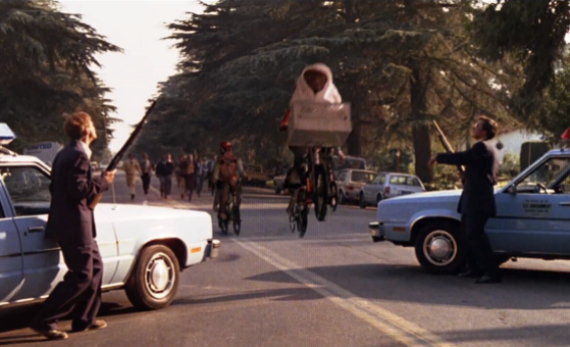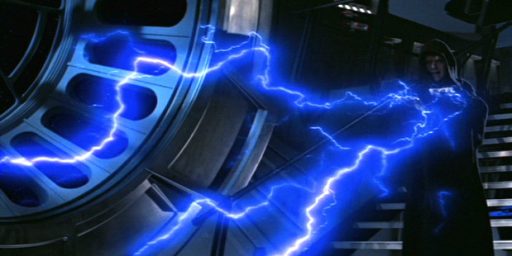Steven Spielberg Pulls A Reverse Lucas
To the great distress of Star Wars fans everywhere, George Lucas has become infamous for the numerous changes he has made to the Original Trilogy over the years. These changes have ranged from the banal, such as adding digital beasts to scenes on Tatooine, to the outrageous, such as changing the bar fight between Han Solo and Greedo so that Greedo, no Solo, shoots first, and adding a bizarre scream to the penultimate scene of Return Of The Jedi. When Steven Speilberg re-released the E.T. The Extra Terrestrial for its 20th anniversary in 2002, he did something similar by replacing guns being held by the government agents chasing E.T. and the children with walkie-talkies. Fans were upset and Speilberg admitted last fall that he regretted the decision to remove the guns from that particular scene. Now, with the movie scheduled to be released on Blu-Ray in October, Spielberg is bringing back the movie as it was originally seen in theaters:
As far as purists are concerned, the folks at Universal buried the lede in the announcement of their new anniversary edition of E.T. Hidden between all the selling points advertised in the Blu-ray trailer below, you’ll catch something special in the footage about 25 seconds in: The guns are back.
(…)
That infamous 2002 rerelease also removed a line in which an angry Elliott called his brother “penis breath,” and redubbed another line in which Elliott’s mother told him he couldn’t go out “dressed like a terrorist.” (She tells him he couldn’t go out “dressed like a hippie,” of which screenwriter Melissa Mathison complained, ”That doesn’t make sense. The mom is a hippie, for God’s sake.”) Other scenes included a CGI E.T. rather than the original physical puppet. Spielberg has wielded the magic touch to restore those scenes as well. Detailing the deleted scenes that will be part of the disc’s extras, the press release notes that they include two scenes from the 2002 version, and a publicist for the release confirmed to me in an email: “It’s the original 1982 version of the film intact.”
Here’s the trailer for the Blu-Ray release (the guns appear around :25)
And, here’s the trailer for the 2002 release, which shows the agents carrying walkie-talkies around the 1:13 mark):
Good on you, Speilberg. Now how about talking some sense into your friend George?
Photo via Slate







Spielberg and Lucas are in the enviable position in Hollywood where there is no one to tell them no. They’re probably not the only filmmakers who would like to change past work, but everyone else has some corporate suit nixing the idea. “It costs too much, forget it. Let it be. Now get out of my office and go make another movie.”
That said, I don’t really blame either one of them for their recent lapses in judgment. I blame the army of yes-men who made it happen.
@Herb:
It also helps that they own, or control the companies that own, the various rights tied to their movies. Francis Ford Coppola wouldn’t be able to go back and digitally change The Godfather films because the rights to the films are divided among at least 3 different groups (his studio, Paramount Pictures and its parent company Viacom, and the estate of Mario Puzo)
@Doug Mataconis:
Helps? Or hurts? Haha
Actually, to be fair, I think for Spielberg, it helps. He is the better filmmaker. His yes men get all the good ideas.
@Herb:
Perhaps helps wasn’t the right word because, in Lucas’s case at least, it has just led to weirdness.
And, yea, Spielberg is clearly the better filmmaker. I couldn’t see Lucas doing something as good as Schindler’s List.
@Doug Mataconis:
There were a few of the Star Wars edits that I thought were improvements, like putting Biggs back into the first film, although in most cases this was the result of putting original footage back in, not newly generated content.
In a broader sense, post release edits can are a mixed bag. Sometimes they make the film worse. Other times, they make it much better. Three particular examples I can think of where the “director’s cut” is considered far superior to the original theatrical release: Blade Runner, Watchmen, and Brazil.
I don’t have an issue about this as long as the original version is still available.
The original version of E.T. was available when you bought the 3 disc edition, the re-release in 2005 omitted the disc with the original version though.
George Lucas testified in front of Congress back in 1988:
Obviously, when he does it, it’s different…
For all the changes George Lucas has done to Star Wars, Chewbacca still doesn’t get a medal at the end.
Why does he hate Wookiees?
@Gustopher:
I know, right? I’ve always believed that Wookie yell at the end of A New Hope is Chewie saying “Hey, where the hell’s my medal?”